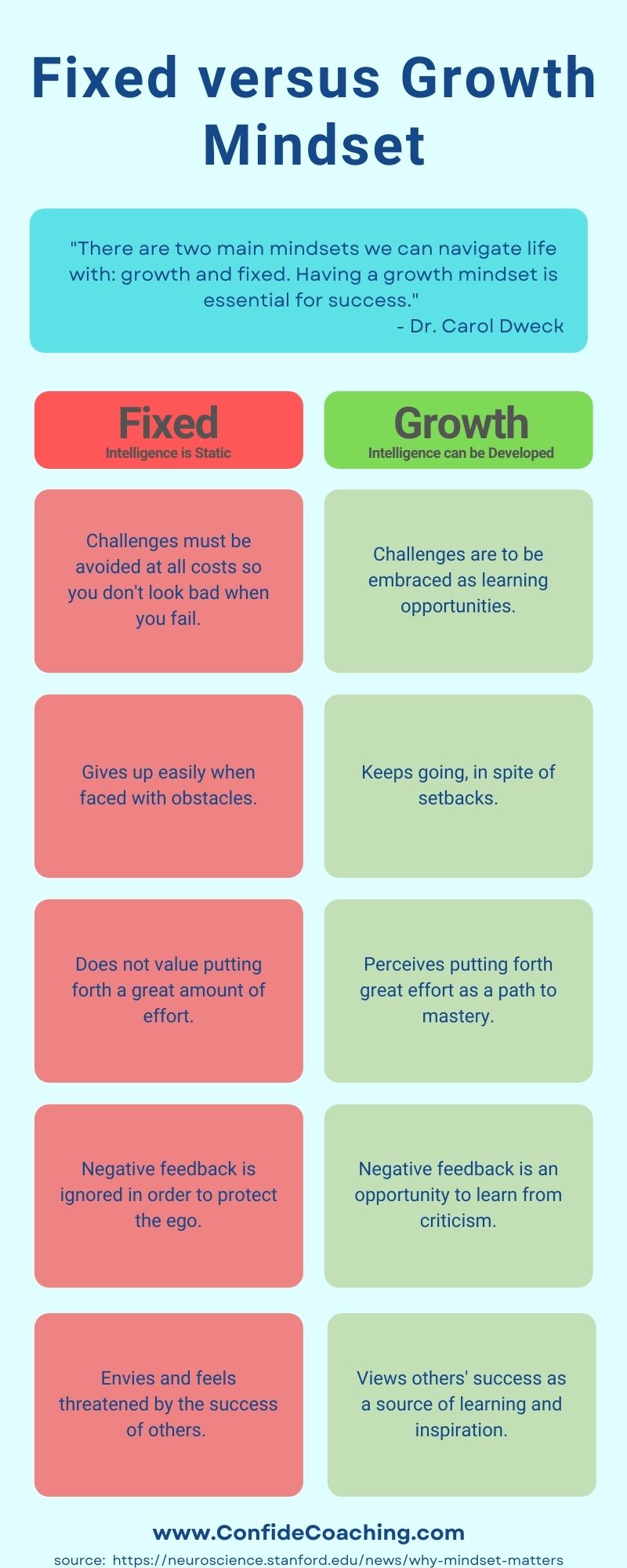
Dr. Carol S. Dweck developed research and subsequent theories revolving around two mindsets, fixed mindset, and growth mindset.
Fixed Mindset refers to a type of thinking pattern that leads to a desire to look smart to others. This leads people who have a fixed mindset to avoid challenges, give up when faced with obstacles. They see effort as fruitless, ignore feedback, and feel threatened by the success of others.
A growth mindset, on the other hand, refers to a type of thinking pattern that leads to a desire to learn. This leads people with a growth mindset to embrace challenges, persist through obstacles and see their efforts as a path to mastery. They are also open to learn from criticism and find lessons and inspiration from the success of others, not to mention possess more psychological flexibility.
Fixed mindsets and growth mindsets can determine the success of individuals. Having a growth mindset can widely benefit an individual both in their personal and professional lives.
Increase Comfort with Taking Personal Risks
Having a growth mindset implies that a person considers intelligence and success to be things that come through continued growth, practice, and risk. Therefore, a growth mindset can make someone feel more comfortable in taking risks in their personal and professional lives.

You don’t have to put your life in danger to take risks that expand your mind.
Taking risks can allow for many areas of growth and success. Risks are necessary if you dream of starting your own business, growing in your professional life, searching for personal development, or simply trying new things.
While comfort zones feel nice, remaining in a comfort zone and ignoring risks out of fear of the process, or failure does not leave room for all your future successes.
Improve Ability to Listen to Feedback
Someone with a growth mindset, as opposed to a fixed mindset, would be more likely to listen to criticism in a manner that promotes growth in intelligence. While a fixed mindset may lead an individual to consider negative feedback to be an attack on their inherent intelligence, a growth mindset allows for individuals to understand criticism to further the development of their skills and knowledge.
Accepting and adjusting to criticism allows for an individual to grow rather than remain stagnant. While criticism can be difficult to listen to, criticism is important in interpersonal relationships, education, occupational growth and so much more.
A growth mindset values the process of learning and expanding intelligence rather than placing value only on success. As the famous line goes, “it’s the journey, not the destination”.
A growth mindset can allow individuals to enjoy the process of growth whether this is in learning a new skill, continuing education, starting a new job, etc. A growth mindset
allows individuals to realize that while they may not be successful at the moment, learning and expanding intelligence is just as valuable if not more valuable than the success that accompanies that growth. This can decrease the possibility of burnout and depression during time of learning and intellectual development.

Coaching Tip from Paul
Recognize that continuing to develop a growth mindset is a life-long practice. There are areas in your life that you are very open to learning and listening to others, and there are areas that you may keep shut tight under lock and key with absolutist thinking.
What are those areas? What type of new data could have you re-think your staunchly held position?
Growth Mindset Improves Self-Esteem
People with a growth mindset are more accurate in estimating their abilities than people with a fixed mindset. A growth mindset allows individuals to understand and identify both their strengths and weaknesses.
Furthermore, they do not see their weaknesses as individual faults. Instead, weaknesses can be improved, and that the process of improving them doesn’t have to be a chore. The ability to reflect on strengths and weaknesses and estimate abilities can significatnly improve self-esteem.
Improve Relationships
As mentioned before, a growth mindset can improve your ability to listen to criticism, improve self-esteem, and increase enjoyment in the process of learning. All of these things are critical in interpersonal relationships. Interpersonal relationships rely on communication, personal growth, and enjoyment in the process for success. A growth mindset allows you to listen to a partner, family member’s, or friend’s needs without it feeling like an attack on yourself.
Additionally, a growth mindset acknowledges that there is always more to learn. Learning from your relationships is a strength, not a weakness, and the journey within relationships is something that should be enjoyed. Relationships aren’t always perfect, but focusing on the process of growth within them is vital to their success.
A growth mindset acknowledges that there is always more to learn and always space to change. Transforming your thinking from a fixed mindset to a growth mindset can be beneficial in virtually every aspect of life. Think growth!

p.s. – What areas of your life aren’t heading in the direction you want? Is your mindset the common denominator? Book a free exploratory session with me and we’ll see if we’re a fit for working together.

Paul Strobl, MBA, CPC
Owner of Confide Coaching, LLC
Paul is a Master Life Coach for GenX and GenY executives and business owners. Originally from Houston, Texas, he has been location independent for most of his adult life. He currently resides in the Rhodope Mountains of Bulgaria near the Greek border with his brilliant wife, 14-year-old stepson (officially adopted in 2021!) and a Posavac Hound rescue.

